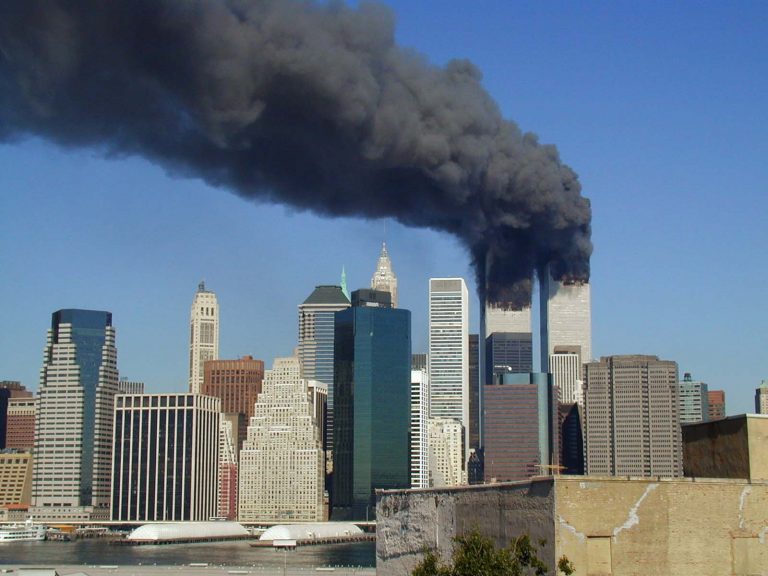
If the 9/11 attacks shook the ground beneath Americans’ feet, many observers say policy changes authorized by Congress following the event created seismic shifts in how the nation decides to go to war, conducts investigations and operates in a shadowy world of counterterrorism.
“In the days following 9/11, Americans wanted and needed to feel safe, and we were willing to grant the president — and Congress for that matter — whatever [was] needed to keep us safe,” University of New Mexico political science professor Michael Rocca said in a recent phone interview.
“Because the next attack felt like it could come from anywhere, [then-Vice President Dick Cheney] and the United States Congress created rules to do that, to keep us safe,” he said. “But in the process, they created a level of executive power we had never seen before.”
Historians, scholars and civil libertarians continue to take a hard look at the changes 9/11 wrought, and not just when it comes to the military.
A joint resolution passed by Congress a week after the terror attacks authorized then-President George W. Bush to use the U.S. military against anyone who “planned, authorized, committed or aided,” the effort, making it the most open-ended authorization for war in the nation’s history.
Prior to 9/11, Congress had to give the president permission to wage war in a designated nation-state or conflict, said Jeffrey Engel, founding director of the Center for Presidential History at Southern Methodist University in Dallas. But the joint resolution, he added, offered the executive branch of government “unchecked power” to deploy the military at will.
“We have basically given the president the blankest of blank checks to use military force at his discretion against any target anywhere in the world at any time,” said Engel. “That is not a war, that is a crusade.”
Later in 2001, Congress approved the USA Patriot Act, the short name for a law that gave the executive branch even more power.
The Patriot Act — and subsequent changes to the Foreign Intelligence Surveillance Act — have been criticized by civil libertarians for what they say was a weakening of traditional standards for probable cause, a central tenet of the legal system. They gave law enforcement the ability to conduct electronic surveillance with little evidence that someone was involved in terrorist activity and broke down distinctions that had traditionally divided criminal investigations and terrorist investigations, ACLU-New Mexico Executive Director Peter Simonson said.
“So, increasingly, federal law enforcement can use tools intended for surveillance of foreign intelligence operatives for the purpose of gathering criminal evidence in a regular criminal investigation,” he said. “Now we are living with the consequences of all those changes.”
Simonson said some of those changes have been pared back in the past two decades by sunset clauses, legislation and litigation, “but so much of it remains intact.”
He pointed to FISA, which he said “authorizes very expansive use of surveillance without the traditional requirements around probable cause and without any sort of public accountability for their decisions.”
Another change to come after 9/11 — one now familiar anytime someone boards an airplane — was the creation of the U.S. Department of Homeland Security. Now the third-largest Cabinet department in the government, Homeland Security’s stated mission is to “secure the nation from the many threats we face.” To do so, its website says the agency employees more than 240,000 people, from cybersecurity analysts to chemical facility inspectors to the men and women who operate the metal detectors at U.S. airports.
Its 2022 fiscal year budget: $52.2 billion, according to the department’s website.
“We reacted very quickly and grew what was already a large bureaucracy into something much more complex,” Santa Fe Council on International Relations Interim Executive Director Jim Falk said.
“Clearly, one thing you have to give credit to is there has not been another 9/11,” Falk said. “But I do think the bureaucracy is overblown, and the amount of money we have spent both domestically and internationally on protecting the homeland to some degree could have been used more efficiently and effectively to keep our house, to improve our house.”
Engel blames the turn of events on Congress, claiming it “abdicated” the authority it was granted by the constitution to limit the president’s power as a necessary part of the government’s system of checks and balances.
But UNM’s Rocca said voters also shoulder some of the blame.
“If [lawmakers] wanted to check the president, they could, but the point is they don’t,” he said. “Sometimes [it’s] just too unpopular or risky or easier to blame a president when things go wrong than it is to take any responsibility for it yourself.”
But he also said voters could change things if they were to pressure Congress.
“Following 9/11, you could make a reasonable argument that everything the commander in chief did in the months immediately after 9/11 historically was justified,” Rocca said. “Congress and the Supreme Court and the public were saying ‘keep us safe’ — they were scrambling for information and they needed every tool they had to make sure we did not get hit again. In the days following 9/11 it could be justified, but 20 years later?”
___
(c) 2021 The Santa Fe New Mexican
Distributed by Tribune Content Agency, LLC.
0 comments :
Post a Comment